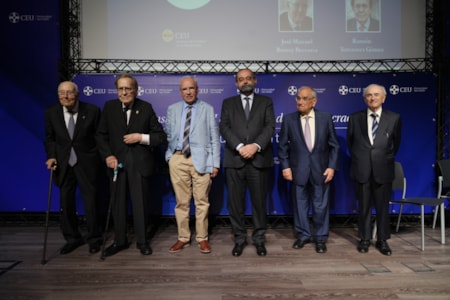
The Institute for the Study of Democracy at Universidad CEU San Pablo celebrated its 20th anniversary with a tribute to the Spanish transition, honouring four prominent figures who played a leading role. The Institute's Political Forum granted the 'Merit for Spain' Award to Alfonso Guerra (Spanish Socialist Workers' Party), Rodolfo Martín Villa (Union of the Democratic Centre), José Manuel Romay Beccaría (Popular Alliance), and Ramón Tamames (Spanish Communist Party), for making it possible to bring all Spaniards together in harmony and ushering in a historic period of freedom, democracy, and well-being.
Former vice president Alfonso Guerra criticised the Government for its agreements with the "heirs of terror" and "separatists," expressing his disappointment over the "pacts with extremists" and his unease about the continuous concessions granted to those convicted of sedition and embezzlement. "You cannot support a coup and claim to uphold the essence of democracy. This has caused immense discomfort for those who live democracy with intensity and conviction," he said.
With this in mind, Guerra asked if "someday" the ruling party might explain "why they find it easier to reach agreements with populists, separatists, and heirs of terror than with the main opposition party." And, he wondered, if the opposition party might explain why "they find it easier to negotiate with the far right than with the ruling party."
In his speech, the former vice president emphasised the value of consensus politics between opposing parties, rejecting the strategy of division in blocs "with a wall marking the line between friend and foe," considering it a "dangerous step backwards in Spain's democratic era." Guerra went on to recall the spirit of consensus between different parties during the transition. "I am convinced that it is necessary to redouble efforts to explain to everyone, to all sectors of the population, what the transition meant in the history of a country that had been so politically tormented for centuries," he stated.
Rodolfo Martín Villa referred to the transition period as a unique moment and “unique era in which Spaniards gave the best of their abilities in the service of all,” emphasising that opinion polls agree on “the desire for fundamental agreements between the two major parties.” He questioned whether it is not possible to have agreements like back then by asking: “Is it not possible to restore to Spanish political life that concensus of national concord proposed by King Juan Carlos without which the transition would not have been possible?”
Echoing these sentiments, José Manuel Romay Beccaría stressed the importance of “preserving the spirit of concord of '78 and avoiding confrontation and discord.” Similarly, Ramón Tamames recalled the culminating moment of the transition: “An understanding between different political forces that allowed the legalisation of the PCE; a long-awaited sign that democracy, through the struggle and efforts of so many, was finally arriving in Spain.”
The President of the CEU Institute for the Study of Democracy, José Manuel Otero Novas, who reviewed the work carried out by the Political Forum, criticised the lack of consensus between the two main parties, “so as not to give in to the voracity of the nationalist parties, against the rest of Spain.” He pointed out that the Institute’s Political Forum proposes two measures. The first is to structure two votes, one in Congress and one in the Senate, so that with 60% of the votes in each chamber, Article 99 can be reformed quickly, establishing that the President of the Government will not be elected by Parliament but by the people in a direct and separate vote, with a possible second round between the top two candidates if no one obtains an absolute majority in the first round.The second proposal is to abolish the procedure for complete amendments to laws. “They are very questionably democratic; the reality shows us that in complete amendments the Government is supported by its own party plus others who receive a payout worth more than their electoral weight, distorting democracy, while those who want more, or who want less, or who want the same, vote together against the bill” he explained.
The President of the Fundación Universitaria San Pablo CEU, Alfonso Bullón de Mendoza, closed the event by congratulating the student winners of the Tacitus Awards and by thanking the recipients of the 'Merit for Spain' award for being excellent representatives of the spirit of the Spanish transition. He concluded: “Defending the spirit of the transition is something that is very necessary in our time.”.
‘Tacitus Group’ Awards
María Bellido, Vice-Rector for Institutional Relations at Universidad CEU San Pablo, Higinio Marín, Rector of Universidad CEU Cardenal Herrera, and Alberto Parejo, Rector of Universidad CEU Fernando III, presented the ‘Tacitus Group’ Awards, with which the Political Forum of the CEU Institute for the Study of Democracy rewards the best proposals and solutions to Spain's problems.
In the Architecture and Engineering category, the prize went to María Silvia Arévalo Poincot, a student at Universidad CEU San Pablo, for her final degree project “Wool in Ruins.” In the Law category, Guillermo Maximiliano Peral Vaello, a student at CEU USP, was awarded the prize for his dissertation entitled “The Legal Protection of National Symbols in Spain.” In the Health Sciences category, Ana Gutiérrez Bardají, a student at CEU USP, received the prize for her dissertation “New Nanostructured Systems Based on Chitosan and Pectin with Biomedical Applications.”